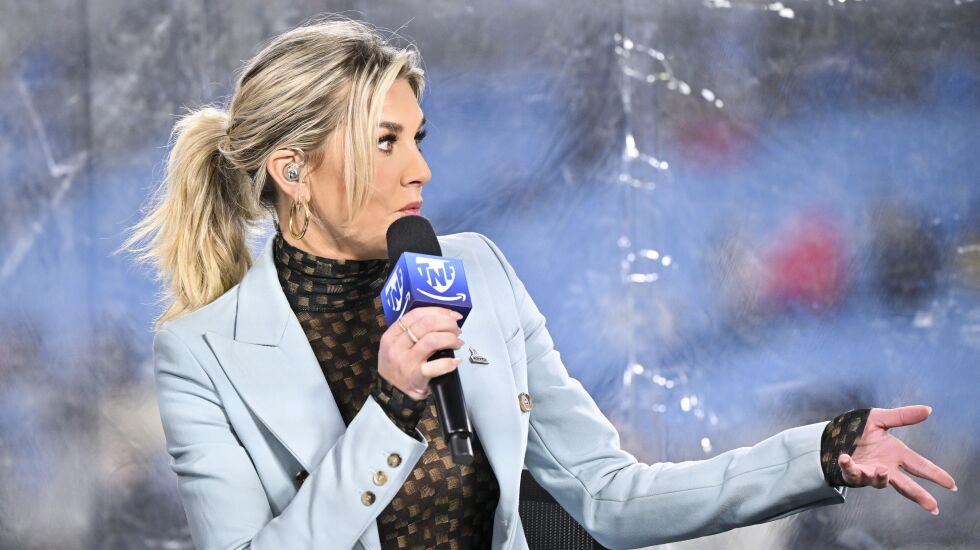
Maybe I shouldn’t care as much as I do about former NFL sideline reporter Charissa Thompson and her admission to making up phony reports some 15 years ago.
But I do.
All journalists should, too. I don’t mean just sports journalists; I mean all journalists everywhere. And so should the public, if it still wants to believe in anything it hears, reads or even sees.
Thompson said on a recent podcast that she made up live game reports ‘‘sometimes because, A, the coach wouldn’t come out at halftime, or it was too late and I didn’t want to screw up the report. So I was like, ‘I’m just gonna make this up.’ ’’
Her logic was that ‘‘no coach is gonna get mad’’ if she just spews words and claims they came from the coach’s mouth because it likely would have been what the coach would have said had she actually spoken with him.
And in an admission in an earlier podcast, she was joined by veteran NFL personality Erin Andrews, who admitted, ‘‘I’ve done that, too.’’
And why did Andrews make up her stuff? Out of purported kindness.
‘‘For a coach that I didn’t wanna throw under the bus because he was telling me all the wrong stuff!’’ is how she put it.
What we have here is journalism as entertainment and, sadly, as genuine fake news. It doesn’t matter what someone would have said; it matters what they did say. If it was nothing, fine. If it was really dumb, fine. It’s OK. We get it.
Journalism is based in fact. And sometimes facts aren’t what we want. So be it.
The networks that employ NFL sideline reporters, almost all women, often seem to have put them there not for information-gathering but for the attraction they will create for the majority-male audience that watches the games.
Phyllis George was among the first female NFL talkers when CBS hired her in 1975 to be the only woman on ‘‘The NFL Today.’’ A former Miss America, George never could get past the perception that she was hired only for her beauty and not for any sports acumen. Yet she was an inspiration for young women who recognized her as a pioneer in the macho sports world.
TV is a visual medium. What you look like is important. I know this well, having been a panelist on ‘‘The Sportswriters on TV,’’ with critics saying we four buzzards had ‘‘faces made for radio.’’
But it seems Thompson, who now works for Fox Sports and Prime Video, didn’t care much about journalism as a profession. Rather, she saw it as a way to be a star.
Lisa Salters of ESPN and Lauren Shehadi of MLB Network are two female reporters who, in my opinion, take their jobs seriously. Being a journalist comes with that responsibility.
It always has troubled me that there is no licensing needed to be a journalist. You need a license to be a doctor, lawyer, electrician, nurse, cosmetologist, therapist, teacher and land surveyor and, of course, to drive a car, open a restaurant, get married and be a makeup artist or a pest-control worker.
But to be a journalist? Nothing.
If they had such a test, I’d be first in line to take it. If I failed, I’d study and go back again and again until I passed. There would be something akin to the Hippocratic Oath involved: Tell the truth as best you can.
I am disturbed by those admissions not because they’re women but because they brought shame on our profession.
In 2020, former President Donald Trump raged to ‘‘60 Minutes’’ interviewer Lesley Stahl: ‘‘I never knew how dishonest the media was. And I really mean it!’’
Belief in journalism is on its way out the door. Many people side with Trump. And the advent of AI, machine-writing, deep fakes and the like have made the profession endangered in many other ways.
Yet journalists around the world literally are dying for what they believe in. According to Statista.com, more than 200 journalists have been killed since 2019. According to a United Nations report, attacks on journalists have happened in at least 101 countries since 2015.
Yes, we’re just sports journalists. But we’re linked with all reporters, even those who cover corruption, revolution and war.
If we just make things up, can you blame people for thinking we’re a joke?







